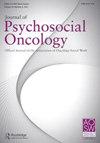新冠肺炎大流行期间癌症幸存者的抑郁、焦虑和孤独。
IF 1.5
4区 医学
Q4 PSYCHOLOGY, SOCIAL
引用次数: 0
摘要
目的评估新冠肺炎大流行对有和无癌症病史的人的抑郁、焦虑和孤独的影响。设计这项前瞻性观察性研究采用了定量方法。参与者凯撒永久研究银行的成年成员(N = 104640)。方法参与者在2020年5月至12月期间完成了一系列调查。使用线性混合回归估计抑郁、焦虑和孤独的得分差异。在癌症幸存者中,21%和19%的人达到了抑郁和焦虑风险增加的阈值。在癌症幸存者中,较年轻年龄组和女性的抑郁、焦虑和孤独评分增加。结论本研究强调了在公共卫生紧急情况期间和之后,解决癌症幸存者的心理健康需求和社会支持的持续必要性。对心理健康提供者的启示癌症幸存者在癌症治疗后可能需要特殊的资源来加强恢复力和提高生活质量。本文章由计算机程序翻译,如有差异,请以英文原文为准。
Depression, anxiety, & loneliness among cancer survivors during the COVID-19 pandemic.
PURPOSE
To assess the impact of the COVID-19 pandemic on depression, anxiety, and loneliness between those with and without a history of cancer.
DESIGN
This prospective observational study used a quantitative approach.
PARTICIPANTS
Adult members of the Kaiser Permanente Research Bank (N = 104,640).
METHODS
Participants completed a series of surveys from May to December 2020. The difference in score of depression, anxiety, and loneliness were estimated using linear mixed regression.
FINDINGS
Among cancer survivors, 21% and 19% met the thresholds for increased risk of depression and anxiety. Among cancer survivors, younger age groups and females reported increased depression, anxiety, and loneliness scores.
CONCLUSIONS
This study highlights the continued necessity of addressing mental health needs and social support in cancer survivors during and after a public health emergency.
IMPLICATIONS FOR PSYCHOSOCIAL PROVIDERS
Cancer survivors may need particular resources after cancer treatment to strengthen resilience and improve quality of life.
求助全文
通过发布文献求助,成功后即可免费获取论文全文。
去求助
来源期刊

Journal of Psychosocial Oncology
PSYCHOLOGY, SOCIAL-
CiteScore
4.20
自引率
0.00%
发文量
36
期刊介绍:
Here is your single source of integrated information on providing the best psychosocial care possible from the knowledge available from many disciplines.The Journal of Psychosocial Oncology is an essential source for up-to-date clinical and research material geared toward health professionals who provide psychosocial services to cancer patients, their families, and their caregivers. The journal—the first interdisciplinary resource of its kind—is in its third decade of examining exploratory and hypothesis testing and presenting program evaluation research on critical areas, including: the stigma of cancer; employment and personal problems facing cancer patients; patient education.
 求助内容:
求助内容: 应助结果提醒方式:
应助结果提醒方式:


